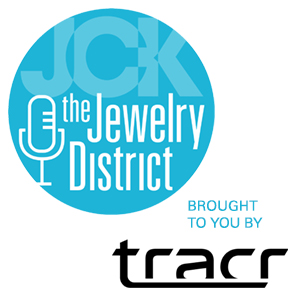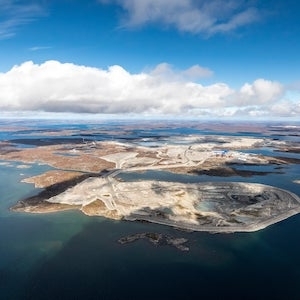
In this week’s episode, JCK editor-in-chief Victoria Gomelsky and news director Rob Bates play excerpts from interviews they did live on the show floors during Las Vegas Jewelry Week. They checked in with the CEOs of John Hardy, the Natural Diamond Council, GIA, and Tracr, as well as other industry leaders, about the future of natural diamonds, the latest on Russian diamond sanctions, trends shaping consumers’ taste in jewelry, and more. Interviewees also discuss takeaways from the JCK Sustainability Summit, including the drawbacks of greenhushing and the power of collective action for a greener future.
Listen Now
Sponsored by Tracr: tracr.com
Show Notes
02:33 Overview
04:58 Jan Patrick Schmitz, global CEO, John Hardy
09:47 David Kellie, CEO, Natural Diamond Council
15:17 Gina Fahnestock, senior associate of responsible sourcing and sustainability, Brilliant Earth
16:03 Wesley Tucker, CEO, Tracr
23:28 Marie-Claire Daveu, chief sustainability officer, Kering
24:23 Susan Jacques, president and CEO, GIA
Episode Credits
Hosts: Rob Bates and Victoria Gomelsky
Producer and engineer: Natalie Chomet
Editor: Riley McCaskill
Plugs: @jckmagazine; tracr.com
Show Recap
Overview
Victoria reports that this year’s JCK show was “vibrant” and “surprisingly upbeat.” Among the highlights: She and Rob both got a chance to talk with Botswana’s president, Mokgweetsi Masisi.
Jan-Patrick Schmitz, global CEO, John Hardy
Victoria chatted with Schmitz at the Luxury show, which the company was returning to for the first time since the pandemic. The laid-back luxury trend dovetails well with John Hardy’s aesthetic, Schmitz says, since younger consumers particularly enjoy “playfulness [and] self-expression through jewelry you can wear every day.”
John Hardy has also noticed the increased interest in men’s jewelry. As a result, the brand is launching more than 70 new products for men this year and planning to unveil more offerings in the fall.
David Kellie, CEO, Natural Diamond Council
For four days during JCK Las Vegas, the Natural Diamond Council (NDC) turned the Venetian resort’s Yardbird restaurant into a dedicated space where industry leaders, retailers, manufacturers, miners, press, and natural diamond enthusiasts could meet to exchange ideas, collaborate, or simply hang out.
Kellie talks about NDC’s presence at JCK, then shares anecdotes from the group’s recent frigid photo shoot in Canada’s Northwest Territories for its “Real. Rare. Responsible.” campaign, starring actress Lily James as a global ambassador. The photographer chose to sleep outdoors so he could capture the beauty of the northern lights in time-lapse, but that required that someone from NDC “slept out on the ice with him” to safeguard a 33 ct. diamond featured in the pictures.
Gina Fahnestock, senior associate of responsible sourcing and sustainability, Brilliant Earth
In an interview following the Sustainability Summit, Fahnestock says companies should avoid not just greenwashing but so-called greenhushing. “If you’re doing good stuff that can be backed up by data, it’s important to advertise that and make sure consumers are aware,” she says. “You’re doing your business a disservice if you’re not advertising the good things that you’re doing.”
Wesley Tucker, CEO, Tracr
Tucker says that while Tracr—The Jewelry District’s sponsor—was founded to support the natural diamond industry before sanctions started making headlines, he believes the blockchain platform can be an important “part of the solution.”
For anyone concerned about the security of rough diamond information, Tucker assures listeners that De Beers has no access to Tracr data. “We have to get it right or people won’t trust us,” he says. He notes that Tracr is ISO 27001 certified, and is a stand-alone legal entity with its own offices.
Tracr is currently exploring the possibility of establishing independent directors and an advisory board, Tucker says. It aims to evolve into an open, independent platform governed by the industry.
He says that when he first attended JCK two years ago, people weren’t interested in blockchain, traceability, or provenance. This year, though, they approached him to ask about those topics. “People have realized that’s where the world is going,” he says.
Marie-Claire Daveu, chief sustainability officer, Kering
A panelist at the Sustainability Summit, Daveu says that if the industry acts “in a collective manner, we can change the paradigm.” She hopes more companies will join the Watch & Jewellery Initiative 2030, which was cofounded by Kering and Cartier.
“Many companies are doing great things,” says Daveu. But with looming dangers from climate change, “we have to put all the initiatives at scale and to speed.”
Susan Jacques, president and CEO, GIA
Jacques thinks the industry is fortunate that governments have engaged with it regarding sanctions on Russian diamonds. “We need greater transparency and traceability,” she says. GIA’s role is to collaborate with others in the trade to work through the challenges of sanctions and origin determination.
The rise of lab-grown diamonds has made the past 18 months some of the most challenging Jacques has seen during her 40-plus years in the industry. “But out of our greatest challenges often come our greatest opportunities,” she says. She is optimistic about the future, provided the industry pulls together to identify potential opportunities.
“People are not falling out of love. They’re falling in love. They will continue to celebrate milestones of life, and they will continue to do that using jewelry, particularly diamonds.”
Any views expressed in this podcast do not reflect the opinion of JCK, its management, or its advertisers.
- Subscribe to the JCK News Daily
- Subscribe to the JCK Special Report
- Follow JCK on Instagram: @jckmagazine
- Follow JCK on X: @jckmagazine
- Follow JCK on Facebook: @jckmagazine






